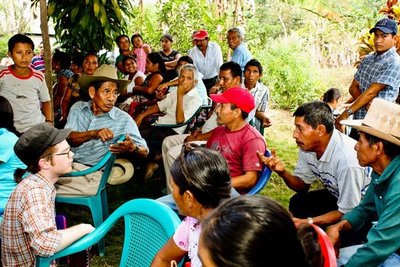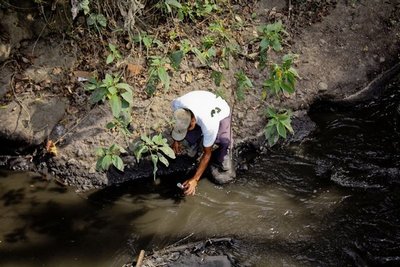April 29, 2010
UW students document human rights abuses related to production of biofuels
Students could smell the Guatemalan river before they were close. It reeked of garbage. Moving closer, they saw the water thick and brown, almost opaque.
But residents of a nearby village were using the water for drinking, bathing and laundry. They have few other choices.
More than a few regularly get sick.
The problem: a mill that processes sugarcane to make bioethanol regularly dumps waste into the river.
Biofuels may be part of the answer to global warming, but producing them has led to environmental problems and abuses of human rights, according to a report written by a UW group that investigated in Guatemala.
Angelina Snodgrass Godoy, an associate professor and the Helen H. Jackson Chair in Human Rights at the Jackson School, as well as 12 students in her senior-level task force course, spent a week earlier this year in Guatemala City and two smaller communities. They talked with government ministers, industry leaders, human rights groups, environmental agencies and laborers who work on the plantations that produce sugar cane and African palm, both raw materials for biofuels.
Earlier this month, the Godoy group discussed their report with Rep. Jim McDermott (D-Wash.). A senior member of the Ways and Means Committee who also serves on the Subcommittee on Trade, McDermott requested more information, including specific action he could take.
Guatemala is the fifth-largest sugar producer in the world and is quickly expanding its palm industry to meet growing demands for biofuels. It’s also had a history of abusing human rights.
About 3,000 people live in the village of Aldea Pajales in western Guatemala. The majority are indigenous Mayan indians. They cultivate fruit, vegetables and maize as subsistence crops and also work on rubber and sugarcane plantations.
According to the villagers, the sugar mill Ingenio El Pilar ejects contaminated water into the Oc, Sis and Ixpacabal rivers, causing contamination and flooding. Then, during Guatemala’s dry season, water dries up, the result of too much irrigation.
Contaminated water has led to skin infections and other illnesses such as diarrhea, particularly among children and the elderly. “We suffer, having to wash clothes in this water,” one woman said. [Owners of the sugar mill] should take us into account as human beings.”
The task force additionally learned that workers are routinely underpaid (Guatemala’s minimum wage is $209.35 per month). Children are a part of the labor force, often working 12-hour days. Demand for biofuel crops has meant less land allocated for food production, thus increasing food prices in the country. Also, according to the report, 70 percent of Guatemalan land is controlled by 2 percent of the population, and the new biofuel crops have caused landowners to further resist changes.
“Seeing these human rights violations first hand makes me want to change the status quo,” said Geoff Morgan, a senior in international studies and civil engineering.
Godoy and her students learned that while biofuels aren’t being exported to the U.S. from Guatemala, that could change as U.S. legislation encourages production. Also, they learned, U.S. tax credits for biofuels will expire between 2010 and 2012, affording chances to write social responsibility into new regulations.
Companies have installed social responsibility programs, but Godoy’s group found lax enforcement.
The solution, says the task force report, is supply chain certification. Producers of biofuel materials would have to prove humane, environmentally safe production methods to sell their goods in the U.S.
Several students from the task force course, including Morgan, continue the research, aiming to change biofuel regulations and secure safe water for Guatemalans.
For additional information click here.


